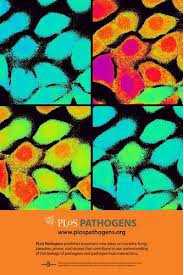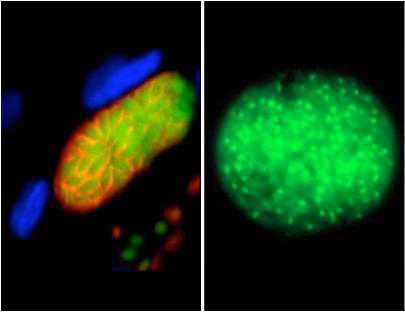PLoS Pathog:鼠弓形虫进入大脑分泌GABA影响个体行为
2013-07-27 T.Shen 生物谷
2012年12月6日,刊登在国际杂志PLoS Pathogens上的一篇研究报告首次揭示了,寄生虫-鼠弓形虫如何进入到人类大脑中来影响宿主的行为表达,这项研究由瑞典卡罗林斯卡医学院和乌普萨拉大学的研究者开展。 鼠弓形虫可以引发弓形体病,这种寄生虫比较常见,其可以感染全球30%至50%的人群,同样也可以感染动物,如家猫。人类通常由于食用感染且未熟的肉类以及处理家猫的粪便而感染鼠弓形虫,数项研究都表
2012年12月6日,刊登在国际杂志PLoS Pathogens上的一篇研究报告首次揭示了,寄生虫-鼠弓形虫如何进入到人类大脑中来影响宿主的行为表达,这项研究由瑞典卡罗林斯卡医学院和乌普萨拉大学的研究者开展。
鼠弓形虫可以引发弓形体病,这种寄生虫比较常见,其可以感染全球30%至50%的人群,同样也可以感染动物,如家猫。人类通常由于食用感染且未熟的肉类以及处理家猫的粪便而感染鼠弓形虫,数项研究都表明,在鼠弓形虫休眠阶段,其感染人类的风险会大大增加,而且使得感染者患精神分裂症的发病率加大。
这项最新研究首次揭示了这种寄生虫如何进入到人类的大脑中,以及增加神经递质GABA的释放量,GABA是一种gaba氨基丁酸的神经递质,其可以抑制个体的焦虑和害怕的知觉。实验室研究中,研究者用鼠弓形虫感染人类树突细胞,树突细胞是人类免疫防御的重要组分,当树突细胞感染鼠弓形虫后,就开始释放GABA到细胞中。在另一项小鼠实验中,当研究者将鼠弓形虫引入到小鼠大脑中后,他们观察了机体中受感染的树突细胞的运动方式。
研究者Antonio Barragan说,弓形体属在感染细胞中分泌神经递质GABA令人非常意外,目前我们应该研究在鼠弓形体、GABA系统以及公众健康威胁之间的关系。

doi:10.1371/journal.ppat.1003051
PMC:
PMID:
GABAergic Signaling Is Linked to a Hypermigratory Phenotype in Dendritic Cells Infected by Toxoplasma gondii
Jonas M. Fuks1,2#, Romanico B. G. Arrighi1,2#, Jessica M. Weidner1,2#, Suresh Kumar Mendu3, Zhe Jin3, Robert P. A. Wallin1,4, Bence Rethi4, Bryndis Birnir3, Antonio Barragan1,2*
During acute infection in human and animal hosts, the obligate intracellular protozoan Toxoplasma gondii infects a variety of cell types, including leukocytes. Poised to respond to invading pathogens, dendritic cells (DC) may also be exploited by T. gondii for spread in the infected host. Here, we report that human and mouse myeloid DC possess functional γ-aminobutyric acid (GABA) receptors and the machinery for GABA biosynthesis and secretion. Shortly after T. gondii infection (genotypes I, II and III), DC responded with enhanced GABA secretion in vitro. We demonstrate that GABA activates GABAA receptor-mediated currents in T. gondii-infected DC, which exhibit a hypermigratory phenotype. Inhibition of GABA synthesis, transportation or GABAA receptor blockade in T. gondii-infected DC resulted in impaired transmigration capacity, motility and chemotactic response to CCL19 in vitro. Moreover, exogenous GABA or supernatant from infected DC restored the migration of infected DC in vitro. In a mouse model of toxoplasmosis, adoptive transfer of infected DC pre-treated with GABAergic inhibitors reduced parasite dissemination and parasite loads in target organs, e.g. the central nervous system. Altogether, we provide evidence that GABAergic signaling modulates the migratory properties of DC and that T. gondii likely makes use of this pathway for dissemination. The findings unveil that GABA, the principal inhibitory neurotransmitter in the brain, has activation functions in the immune system that may be hijacked by intracellular pathogens.
(责任编辑:yan.mao)
本网站所有内容来源注明为“梅斯医学”或“MedSci原创”的文字、图片和音视频资料,版权均属于梅斯医学所有。非经授权,任何媒体、网站或个人不得转载,授权转载时须注明来源为“梅斯医学”。其它来源的文章系转载文章,或“梅斯号”自媒体发布的文章,仅系出于传递更多信息之目的,本站仅负责审核内容合规,其内容不代表本站立场,本站不负责内容的准确性和版权。如果存在侵权、或不希望被转载的媒体或个人可与我们联系,我们将立即进行删除处理。
在此留言









#分泌#
61
#弓形虫#
77